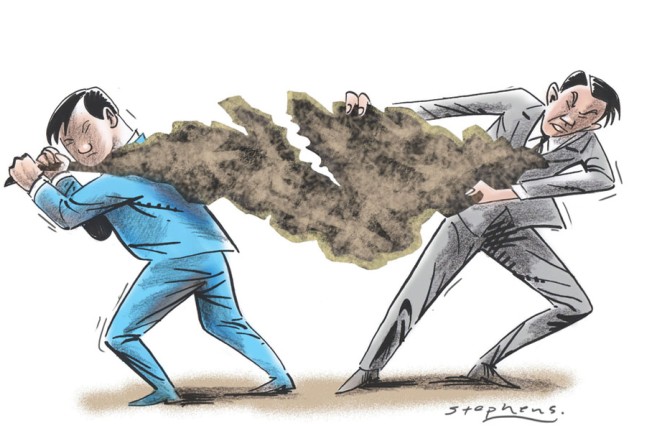Sino-Japanese relationship too brittle for comfort
Lanxin Xiang says both Japan and China are to blame for allowing an argument over disputed islands to harden and jeopardise the region's most important bilateral relationship

Singapore's prime minister, Lee Hsien Loong, made a speech to a Japanese audience earlier this year, in which he claimed that if the Chinese government should decide to use non-peaceful means to take the Diaoyu/Senkaku islands, it may lose the world. The statement apparently irked the Chinese a great deal, albeit belatedly. The nationalistic paper Global Times made a big fuss of it some two weeks ago. But Lee's argument is not entirely wrong.
The tensions between China and Japan over these islands are unnecessary, unwarranted and extremely harmful not only to the most important bilateral relationship in the region; they have also destroyed a reservoir of goodwill between the two peoples, painstakingly built by leaders on both sides for more than half a century.
Leaders like Zhou Enlai and Kakuei Tanaka would surely turn in their graves if they could see what is happening between the two nations, where polls show that a majority of the populations hate the other.
There is, however, little doubt that both sides are to blame. Tensions have built up because of clumsy diplomacy by both governments. The island dispute has been largely a non-issue for decades. But, since 2010, Japan has jumped on the US "pivot" to Asia all too enthusiastically, which has caused enormous suspicion in Beijing of a joint containment strategy against China.
The turning point undoubtedly came last autumn when the Japanese government announced a plan to "nationalise" these islands, which were under threat from the Tokyo governor, who was raising money to "buy" them.
Although the Japanese government was motivated by good intentions - it was trying to pre-empt a scheme by the extreme right to derail Sino-Japanese relations - the unfortunate use of the term "nationalisation" not only provoked a strong reaction from China, it also deepened suspicions.
The term "nationalisation" reflects a total lack of historical sensitivity on the part of Tokyo. First of all, the Japanese do not have undisputable sovereign rights over the islands and one cannot "nationalise" something one does not own. Second, the main Japanese claim of sovereign rights through a reference to the Treaty of Shimonoseki of 1895 pours oil on fire, as this is one of the most humiliating "unequal treaties" in modern Chinese history.
Like Margaret Thatcher's historic mistake of demanding a "renewal" of the 99-year lease of 1898 over Hong Kong's New Territories, building a historical legality by reference to an "unequal treaty" would surely push any Chinese leadership into a political corner where there is little room for them to manoeuvre.
Another big miscalculation by Tokyo was its belief that the Chinese Communist Party wanted this crisis to divert attention from its own legitimacy problems. In fact, the eruption of this dispute was the last thing the newly installed leadership under Xi Jinping wanted to see.
On the Chinese side, however, its impatience and overreaction were also uncalled for. China has the high moral ground on this dispute, but it will lose this moral advantage if the dispute turns into a military conflict. Japan has acquired a reputation for being a peaceful and responsible power while China is still building such a reputation and trying to convince the world of its "peaceful rise".
Beijing seems to have adopted a firm position of rebuffing any Japanese initiative for summit meetings, unless Tokyo publicly changes its position. This approach is ineffective and unfair. A historical precedent is the "Waldheim Affair", in which the former UN secretary general and then president of Austria, Kurt Waldheim, was put on a "watch list" by the US and banned from entering the country because of an accusation of crimes committed during his wartime military service. It was a major diplomatic rebuff of a leader.
China should not dismiss the Japanese intention to hold a goodwill summit to resolve the problem. Last year, when the Japanese government announced the "nationalisation" plan, Beijing and most of its propaganda machines were accusing Tokyo of "colluding with the extreme rightists" in a clever plot to steal the islands. This is not a fair accusation to begin with.
There are many issues between the two countries. The fact that the island dispute has been allowed to override other priorities, such as strategic trust, economic ties and, more importantly, people-to-people relations, indicates a victory for the right-wing forces in Japan.
Xi should meet Abe at the G20 summit, which starts today in St Petersburg. But such an event should not be used by either side simply for diplomatic niceties. The Sino-Japanese relationship is at a critical historical moment, after the second world war, and both sides should make sincere efforts to repair it.
To have a serious summit, however, the Japanese side must rethink its use of the term "nationalisation", to either find a new term or tone down the implication of undisputed ownership. A better phrase would be "taking over the administrative authority".
Lanxin Xiang is professor of international history and politics at the Graduate Institute of International and Development Studies in Geneva